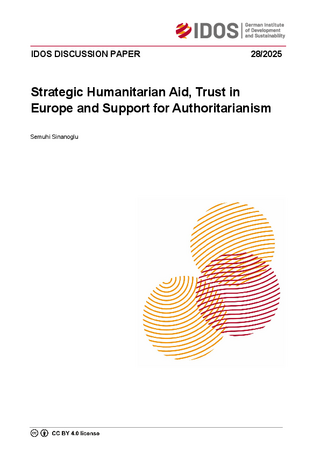Strategic humanitarian aid, trust in Europe and support for authoritarianism
Sinanoglu, SemuhiDiscussion Paper (28/2025)
Bonn: German Institute of Development and Sustainability (IDOS)
ISBN: 978-3-96021-273-7
DOI: https://doi.org/10.23661/idp28.2025
How does international assistance impact public attitudes towards donors in the recipient country when tied to strategic interests? European leaders increasingly highlight the strategic and transactional nature of international assistance. Yet, we still do not know much about how such shifts in the framing of international assistance are perceived by the recipient public, especially in contexts with prevalent anti-Western attitudes and propaganda that dismisses aid as hypocritical and disingenuous. I conducted an online survey experiment in Turkey to assess the attitudinal and quasi-behavioural effects of different types of international assistance post-disaster – conditional, unconditional, and strategic – and whether they help sway public attitudes in the face of authoritarian propaganda. Strategically distributed humanitarian aid decreased trust in the government as a defender of national interest among conservative, nationalist and Eurosceptic regime supporters, and also increased trust in European organisations. It did so partly by mitigating conspiracism and evoking positive emotions among pro-government voters whose views are hard to change. However, this comes at a cost: increased trade scepticism and decreased engagement with foreign media outlets among regime opponents. The findings have significant implications for international assistance strategies for increasing European soft power.

